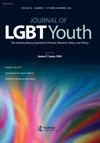Inaccessible and stigmatizing: LGBTQ+ youth perspectives of services and sexual violence
IF 1.8
Q1 SOCIAL SCIENCES, INTERDISCIPLINARY
引用次数: 1
Abstract
Abstract Lesbian, gay, bisexual, transgender, queer, and questioning (LGBTQ+) young people are subject to high rates of sexual violence globally, significantly impacting their lives and psychological wellbeing. However, service use for sexual violence support is low for LGBTQ+ groups and there is no current research exploring LGBTQ+ young peoples’ experiences and perspectives of support services in the UK. To understand service utilisation for LGBTQ+ young people who have experienced sexual violence, a mixed methods exploration of survey data (N = 36) and individual interviews (N = 7) was conducted with LGBTQ+ young people aged 16–25. Participants reported a high prevalence of multiple types of sexual violence (e.g., 86.11% subject to sexual assault) and low reporting to any service (30.56%). Content analysis identified interpersonal, service, and sociocultural factors that limit service utilisation and sexual violence reporting. Two themes were identified through thematic analysis: ‘safety and acceptance’ which discussed participants’ positive experiences of services, and the theme ‘services as hard to reach’ explored how discrimination, heteronormativity, and victim-blaming impacted service accessibility. Implications for best practice for services supporting LGBTQ+ young people subject to sexual violence are discussed and a model is presented to address service utilisation.无法获得和污名化:LGBTQ+青年对服务和性暴力的看法
全球范围内,女同性恋、男同性恋、双性恋、跨性别、酷儿和质疑(LGBTQ+)年轻人是性暴力的高发群体,这对他们的生活和心理健康产生了重大影响。然而,LGBTQ+群体对性暴力支持的服务使用率很低,目前也没有关于英国LGBTQ+年轻人对支持服务的经历和观点的研究。为了了解遭受过性暴力的LGBTQ+年轻人对服务的利用情况,对16-25岁的LGBTQ+年轻人进行了调查数据(N = 36)和个人访谈(N = 7)的混合方法探索。参与者报告了多种类型的性暴力的高患病率(例如,86.11%的人遭受过性侵犯),而向任何服务机构报告的患病率较低(30.56%)。内容分析确定了限制服务利用和性暴力报告的人际、服务和社会文化因素。通过专题分析确定了两个主题:“安全和接受”,讨论了参与者对服务的积极体验,“难以获得的服务”,探讨了歧视、异性规范和受害者指责如何影响服务的可及性。讨论了支持遭受性暴力的LGBTQ+年轻人的服务最佳实践的影响,并提出了解决服务利用的模型。
本文章由计算机程序翻译,如有差异,请以英文原文为准。
求助全文
约1分钟内获得全文
求助全文
来源期刊

Journal of LGBT Youth
SOCIAL SCIENCES, INTERDISCIPLINARY-
CiteScore
5.40
自引率
8.30%
发文量
30
期刊介绍:
The Journal of LGBT Youth is the interdisciplinary forum dedicated to improving the quality of life for lesbian, gay, bisexual, transgender, and questioning youth. This quarterly journal presents peer-reviewed scholarly articles, practitioner-based essays, policy analyses, and revealing narratives from young people. This invaluable resource is committed to advancing knowledge about, and support of, LGBT youth. The wide-ranging topics include formal and non-formal education; family; peer culture; the media, arts, and entertainment industry; religious institutions and youth organizations; health care; and the workplace.
 求助内容:
求助内容: 应助结果提醒方式:
应助结果提醒方式:


